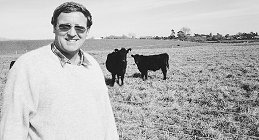|
|
Farm is spread Around the City  Tony Childs is like no other farmer in New Zealand. He has sections of his 200-hectare farm in various parts of Christchurch and has to use more traffic lights in his working day than any other farmer.
Tony Childs is like no other farmer in New Zealand. He has sections of his 200-hectare farm in various parts of Christchurch and has to use more traffic lights in his working day than any other farmer.
He also has to farm in a way to help the breeding of birds, and he has more neighbours than any other farmer in the country. Despite these limitations, and associated high travel costs, Tony manages to fulfil a niche market with his Angus stud bulls and each year the farm breaks even economically. Christchurch City Council has run Estuary Farm for about 25 years. It was set up for the disposal of bio-solids from the sewage treatment plant. However, bio-solids haven't been spread on the farmland for the past two years. First they were put in the Burwood landfill and now they go to land at Selwyn Plantation. So far, this change has not altered the high fertility of the land at Estuary Farm; most of which is next to the Bromley sewage treatment station, and much of which used to be Bexley rubbish dump. Tony Childs was brought up on a hill-country Cheviot farm and when he left school worked with a shearing gang. He then bought a farm at Manuka Bay, near the Hurunui River mouth, where he ran 6000 sheep and beef units. After 15 years he sold it and came to Christchurch for his children's education. He was the farm assistant for 18 months before becoming manager following the death of the original manager, Dick Wilcox, 11 years ago. Now Tony has more than 420 cattle on the farm; nearly 150 Angus stud breeding cows, along with Angus bull yearlings and two-year- olds, and Hereford bulls. He sells bulls to South Island dairy farms to service cows after herds have been artificially inseminated. Tony says only 65-70 per cent of cows "take" under the artificial system and that's where his bulls come into their own. Calving on Estuary Farm goes on all-year round to ensure supplies of bulls to town-milk dairy farmers so that milk production never fails. About three-quarters of the farm is north and south of the sewage treatment station's settling ponds, with the remaining land scattered around the city limits, mostly around pumping and storm-water stations. To get around his split farm, Tony travels up to 200km a day between paddocks. He is a farmer without a farmhouse but he points out there is a shed on the Bromley property. A full-time stockman works with Tony and another nine treatment station workers can be called on to help when needed.
Because the ponds at the treatment station are wildlife sanctuaries, the farm has to be managed with bird protection in mind. For instance, grazing is always stopped near nesting birds. The Council has another 200-hectare lamb- fattening farm around the Templeton wastewater treatment station. It is leased to a private farmer although Tony oversees it. A sheep-grazing farm is also at Christchurch International Airport and is managed by the Airport Company (75 per cent owned by the Council). The Parks Unit leases other Council farmland. For more than 50 years soldiers from World War Two have reported for duty almost every week of the year on the Port Hills to create a memorial to their fallen comrades. |